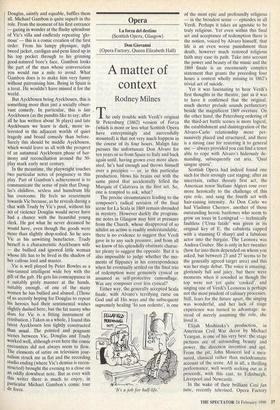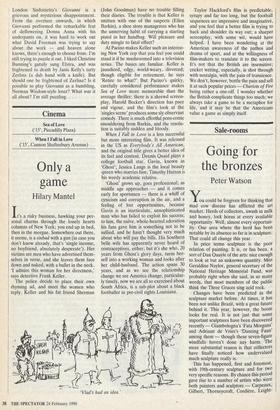Opera
La forza del destino (Scottish Opera, Glasgow) Don Giovanni (Opera Factory, Queen Elizabeth Hall)
A matter of context
Rodney Milnes
The only trouble with Verdi's original St Petersburg (1862) version of Forza (which is more or less what Scottish Opera have enterprisingly and successfully mounted) is that not very much happens in the course of its four hours. Malign fate pursues the unfortunate Don Alvaro for ten years or so from Spain to Italy and back again until, having grown ever more alien- ated, he's had enough and throws himself over a precipice — or, in this particular production, blows his brains out with the same pistol that accidentally felled the Marquis of Calatrava in the first act. So, one is tempted to ask, what?
The precise circumstances leading to the composer's radical revision of the final scene for La Scala in 1869 remain shrouded in mystery. However darkly the program- me notes in Glasgow may hint at pressure from the Church, whose disapproval of so nihilist an action is readily understandable, there is no evidence to suggest that Verdi gave in to any such pressure, and from all we know of his splendidly obstinate charac- ter plenty to suggest the opposite. But it is also impossible to judge whether the mo- ments of flippancy in his correspondence when he eventually settled on the final trio of redemption were genuinely cynical or assumed as self-protective camouflage. Was any composer ever less cynical?
Either way, the.generally accepted Scala finale, with Alvaro's terrifying curse on God and all His ways and the subsequent supremely healing lo son redento', is one 'It's a job for half-life.' of the most epic and profoundly religious — in the broadest sense — episodes in all Verdi. Perhaps it takes an agnostic to be truly religious. Yet even within this final act and acceptance of redemption there is the notion, voiced by Alvaro himself, that life is an even worse punishment than death, however much restored religious faith may ease its path. Take into account the power and beauty of the music and the 1869 finale is an enormously complex statement that grants the preceding four hours a context wholly missing in 1862's trivial act of suicide.
Yet it was fascinating to hear Verdi's first thoughts in the theatre, just as it was to have it confirmed that the original, much shorter prelude sounds perfunctory beside the magnificent 1869 overture. On the other hand, the Petersburg ordering of the third-act battle scenes is more logical, the establishment and disintegration of the Alvaro-Carlo relationship more per- suasively placed and structured, and there is a strong Case for restoring it to general use — always provided you can find a tenor able to cope with Alvaro's hideously de- manding, subsequently cut aria, 'Qual sangue sparsi'.
Scottish Opera had indeed found one such for their strongly cast staging: after an uncertain, rather throaty first act, the American tenor Stefano Algieri rose ever more heroically to the challenge of this epic role, and sang the fourth act with hair-raising intensity. As Don Carlo we had Vladimir Chernov, another of those outstanding heroic baritones who seem to grow on trees in Leningrad — technically faultless ('Urna fatale' was given in its original key of E, the cabaletta capped with a stunning G sharp) and a fabulous actor into the bargain. The Leonora was Andrea Gruber. She is only in her twenties (how far into them depended on whom you asked, but between 23 and 27 seems to be the generally agreed target area) and this was her stage debut. The voice is amazing, gloriously full and juicy, but there were moments when it sounded as though the top were not yet quite 'cooked', and singing one of Verdi's Leonoras is perhaps not the most prudent of culinary processes. Still, fears for the future apart, the singing was wonderful, and her lack of stage experience was turned to advantage: in- stead of merely assuming the role, she lived it.
Elijah Moshinsky's production, in American Civil War decor by Michael Yeargan, is one of his very best: the stage pictures are of astounding beauty and power, the direction inventive and apt. From the pit, John Maticeri led a mea- sured, classical rather than melodramatic account of the score. All in all, a thrilling performance, well worth seeking out as it proceeds, with this cast, to Edinburgh, Liverpool and Newcastle.
In the wake of their brilliant Cosi fan tune, recently televised, Opera Factory London Sinfonietta's Giovanni is a grievous and mysterious disappointment. From the overture onwards, in which Giovanni performed the remarkable feat of deflowering Donna Anna with his underpants on, it was hard to work out what David Freeman was trying to say about the work — and heaven alone knows, there's enough to choose from. I'm still trying to puzzle it out. I liked Christine Bunning's gutsily sung Elvira, and was frightened to death by Janis Kelly's tarty Zerlina (a dab hand with a knife). But should one be frightened of Zerlina? Is it possible to play Giovanni as a bumbling, Norman Wisdom-style loser? What was it all about? I'm still puzzling. . . .



















































 Previous page
Previous page